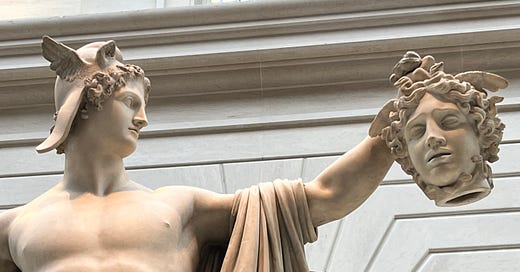The Condition of Poetry at the End of the World
I recently wrote and delivered this talk at the Vermont Studio Center about poetry and the role of the artist at this moment in time. I'll publish it here in installments.
This talk is meant to offer the listener opportunities for adjusting one’s perspective on the current state of our lives as writers and artists. I realize as I type this just how presumptuous this sounds, how puffed up and self-important, so let me also say that I am writing these ten theses to clarify my own thinking. If something I mention resonates with you, that’s marvelous. If nothing here does, that’s fine too. We are all on a trajectory the destination of which is unknowable.
I have organized this talk into ten theses, and yes, I’m referring to Martin Luther. I was raised among members of the Norwegian mafia in Minnesota and Wisconsin, otherwise known as the Evangelical Lutheran Church of the United States, and Luther nailing his ten theses onto the church door of Wittenberg Cathedral is one of those moments that was presented to young Lutherans as a liberation, though also an action that was bound to lead to struggle. (Struggle feels like a funny word to describe the Thirty Years War, but I’ll leave it there). Luther’s theses were both a declaration of faith and a call to action and reform, and they kicked off the big party we call The Reformation. My talk will offer a little of each of these things: declarations of faith, and calls for reform.
We are living through what The Economist just called the largest trade disruption in world history. Right-wing would-be dictators and actual dictators around the world hold sway over huge populations. Americans watch while vindictive and ignorant men sink our institutions, attack higher education, disrupt and destroy decades of scientific and medical research, threaten and intimidate students, deport immigrants to concentration camps. ICE is operating as a de facto Gestapo, and politicians in Washington attempt to block us from our right to vote and rob us of our civil rights. A confused and ill man whose own brain was damaged by a parasitic worm, and who once deposited the carcass of a dead bear in Central Park as some kind of convoluted prank, and who is now the head of the Department of Health and Human Services, is discouraging people from getting vaccinated for measles, or polio. Three months ago, Los Angeles was on fire. Last autumn, the Hudson Valley burned. For two summers in a row, eastern Canada has burned. As our eyes burn, and brim with tears, it makes it look as if the world is ending.
The world is not ending.
The world is changing, and the world has always changed. Sometimes things change for the better, but often they don’t. It just seems like things are ending, but really, the world will be there when our president is dead, when all the presidents of the world are dead, when everyone you ever knew is dead. The world will be still be there. Just this month, a pair of dire wolves were born, and the last time they sniffed the air, howled, marked their territory was 10,000 years ago during the last Ice Age. We don’t know what will last, or not last. All we have is this very moment. So, the world isn’t ending. We are, but we are always ending—every day could be our last. Which is what art is for—to help make that fact bearable.
1. Thesis Number One: Art Makes the Human Condition Bearable.
I don’t know about you, but I write poems because I want experience to mean something, and for me a poem is the self and the soul intersecting with Time, rendered into language. I would define the self as being all that we know and remember, the experiences we feel in our body, everything we have read, the languages we speak, the love we carry and that we have given and received, our educations. Our soul is that which is eternal within us, that which we contain that will not dissipate, the part of us that lives independent of our ego. Poems happen in time and so they also mark time, by stilling it momentarily. Once written, a poem contains something of the person who wrote it, and there it will remain, waiting to be reanimated by a reader. When we breathe in are, and breathe out a poem, read it back into the work, the poet—even if long dead—uses our body as an instrument. We breathe them back into the world. A library is a columbarium, it stores the dead (and the living too, but mostly the dead). Each book contains part of the person who wrote it, and so the work of librarians is sacred work. We already knew that, but think of all they do, and not that you wouldn’t do this, but give generously to your local library, and be nice to your librarian. They are doing service in the realm of the eternal.






One of the reasons I like working in a library is the gratitude. People thank you. Of course, I’m into the books, too.
Beautiful conception of poetry. It is a death-defying act.